
Los Angeles-based artist Patrick Lee strives to explore – and deconstruct – contemporary concepts of masculinity and beauty. Seeking out “rough men,” Lee snaps a quick shot and then spends countless hours sketching granite recreations. The result: a startlingly contradictory collection of breathtaking images. And a new definition of beauty.
In this interview, his first published chat, Lee and editor Andrew Belonsky discuss the artist’s process, the ever-evolving state of American masculinity and why men are so fearful. After the jump, of course…
Andrew Belonsky: How has your upbringing affected your art?
Patrick Lee: I grew up in N. Western Montana. As you can imagine, it was very blue collar and that definitely has been formative for me, having worked in blue-collar environments and being surrounded by it.
AB: How do you mean?
How about we take this to the next level?
Our newsletter is like a refreshing cocktail (or mocktail) of LGBTQ+ entertainment and pop culture, served up with a side of eye-candy.
PL: Formative as far as what I’ve focused on, concentrated on and observed. What I’m currently interested in channels through that. Some of the masculinity issues that I’ve tried to deal with in my work have definitely been informed from the environment that I grew up in.
AB: Do you find that sort of environment to be erotic?
PL: No. It’s fascinating. I’m interested in how men communicate on multiple levels and how they negotiate their own world through posturing and their behavior. It fascinates me on an anthropological level.
AB: Looking at your at your art, one sees blood and bruises and scratches, but you look into the subject’s eyes and you see a vulnerability. I see two things. You shine a light through these men’s masculinities: you’re cutting through it, showing the human emotional side of rough men. I also see a more universal message – a commentary on masculinity today.
PL: Yes. You’re right on target.
AB: What are you trying to say? What’s happened to masculinity today, especially compared to what you grew up with?
PL: Men seem to be more self-conscious about what they’re trying to convey about themselves. In the past, when I was growing up, it felt more natural; there wasn’t a lot of affectation. Men just – that’s the way you behaved. I guess the older I got, I just realized in society this violent aggression, this strong desire to definitely be ultra-masculine. Anything other than that is a threat or tossed away.

AB: Yeah, I think that men find their masculinity to be threatened, especially with gay rights being such a big issue in America – and powerful women.
PL: Yes. Absolutely. For whatever reason, that’s just so threatening to them, but when you actually meet these individuals one-on-one, talk to them, hang out with them, they are vulnerable. I don’t want to use the word “normal,” but they’re not – as long as you’re not threatening them or they’re not competing with other men or competing to be seen as tough and masculine, they totally chill out. There is this ridiculous overcompensation and competition amongst men to be perceived as this thing, this ideal.
AB: Do you find yourself to be competitive?
PL: I do, yeah. Definitely. Mostly with myself. I get threatened by other people’s work that I see as really amazing. I want to rise to that.
AB: How do you find your subjects?
PL: Everywhere I go – I mostly walk in LA –
AB: You know, nobody walks in LA.
PL: Exactly! Wherever I go, I bring a little portfolio with me that has samples of drawings and photographs of subjects I’ve taken. I cut right to the point. I go up to these guys and I say, “Hey, I don’t mean to bother you, but would you be up for…” I just tell them what I’m doing. And, I have to say I’m really shocked: most guys are receptive to it and immediately get it. Most of these guys are either on their break, or working or going somewhere, so I have to be really quick and really blunt. The photo sessions last anywhere from 30 seconds to a couple of minutes. On some occasions – if the men aren’t going anywhere or are homeless, I’ll talk to them for several hours.
AB: Do you tell them that you’re gay?
PL: I don’t. Honestly, it’s never come up. If they asked, I’d have no problem telling them. I think that most of these guys have been around – they’re pretty smart, they’re pretty intuitive – I would think that they either know or realize later when they think about it. It never comes up. It’s not really an issue.
AB: What do you think they get out of this? It can’t be all altruism.
PL: Different reasons for different individuals. I think mostly they like to be perceived as badass or some tough guy. It reinforces – No body else, their buddies, would come up to them and say, “Oh, you’re looking really macho.” They are flattered. They’re really humble about it and it’s cool.
AB: I think all men need validation.
PL: Definitely. Men are extremely vain and if you tap into that ever so slightly… I don’t really have to give much direction to these guys. They really get it. I just say, “Be yourself” and walk around them and take shots.
AB: Do you consider yourself to be masculine?
PL: Uh…I don’t know. I mean…
AB: Do you strive to be masculine?
PL: I don’t strive really. I am myself. I want to be free. I try not to be conscious of it. I definitely don’t try to curtail my behavior in anyway.
AB: Who are some of your influences – artistically.
PL: There’s a – this term doesn’t really capture – he’s a Western artist, his name is James Bama. He’s done these incredibly detailed drawings and paintings of subjects in Wyoming. Mostly ranchers and cowboys: stunning, stunning works. There’s also a book called Roughnecks that came out in 1985 by this photographer named Kip Kittle. That’s one of my favorite books. It’s just such a great photo documentary of a period, place, people. I think his portraits of predominantly white men are just – again, there’s a sincerity there, an intimacy that’s rare. You just don’t see it that much.

AB: You’ve always considered yourself an artist? Even as a kid?
PL: Yeah, but I was reluctant to use that term.
AB: Are you reluctant to use it now?
PL: No. There’s a source of pride in saying that now. I’ve finally come to appreciate that and have that role. I want to continue doing that.
AB: What changed?
PL: I needed to mature as a human being. I didn’t have experience. I felt that I was so naïve for so long and kind of a dilettante. I wasn’t worthy or ready yet. I don’t know, it’s just – after working on one particular project for a set number of years, I felt like, “Okay, you’ve taken it seriously enough. It’s realizing itself”.
AB: Are there other ideas of masculinity that you either want to depict or to see…
PL: I’m definitely fascinated by masculine environments, industrial areas, spaces where men are working. I take pictures of that all the time, too, absent of people in them.
AB: Just the spaces – the raw spaces?
PL: Yeah, work environments or the vehicles. A forklift. I find that endlessly fascinating. I’d like to explore environments.
AB: Do you idolize masculinity?
PL: “Idolize” is not the right word.
AB: Revere?
PL: Yeah, possibly. I’m fascinated by it – whatever it is that makes it – that works for me. It’s fascinating… I love the idea of being an outsider and being outside of society. There’s a need somewhat to be anonymous to protect yourself on some level. You don’t want to get too intimate with people. I think that’s true of a lot of gay guys. I think that’s why they live in big cities, because there is that distance. You don’t want your private life to be poked at too much. It’s a survival thing.
AB: Do you think that’s why you’re so intrigued by the idea of masculinity? It seems like a social construct used to fend people off…
PL: That definitely could be an aspect of it. I love the idea of lone wolves and the individual. I have a disdain for the group. I find that a lot of these individuals can’t really function within society that well, either. That’s why they run into trouble. They have contempt for [society]. I kind of share that.

AB: In some ways you are an iconographer of masculinity: you are making it into an overarching, universal cultural symbol. At the same time, however, you are an iconoclast. You are showing this tenderness, this vulnerability of these men. I’m assuming that’s something you’re doing intentionally…
PL: I definitely wanted that contrast. The technique, especially, being very precious and intimate, and taking time and working on such rough subjects, I wanted that contrast. I hadn’t seen it before, quite honestly.
AB: Can you explain the intimacy that you have with these people?
PL: It’s weird. Three years ago, when I started this, there was no way in hell I could approach someone on the street and ask to take their photo, but I forced myself to do it. I’m extremely shy, but I’ve found – it’s given me optimism about humans. Most people, regardless of the way they look or aspire to look, are pretty decent – as long as you show them respect and don’t try to abuse them.
AB: So, you could say this masculinity project helped you grow a pair of balls?
PL: [Laughs.] Yes, in some ways it did.. It’s been therapeutic for me. I’m not as fearful of people in general.
AB: What is it about men that you find so fascinating?
PL: That’s a discovery I’m making every day. I don’t know: their nuances, their behavior, facial structures. So many elements.
AB: I love watching men shave, which a lot people think is strange. There’s just so much concentration. That’s when a man is at his most vulnerable.
PL: When they’re being so earnest?
AB: Exactly!
PL: I love that lack of self-consciousness. It’s pretty wild.
AB: What do you have next on your plate?
PL: I’m going to continue working on this. There’s art fair in Miami coming up. Keep doing what I’m doing.




Image Notes:
Deadly Friends (Snitch), 2006
Deadly Friends (Head #12), 2006
Deadly Friends (Rough 06-07), 2006
Deadly Friends (Rough 06-08), 2006
Deadly Friends (Head #6), 2006
Deadly Friends (Blowing Smoke), 2006
Deadly Friends (Goat), 2006
Deadly Friends (Kings Until Death), 2006

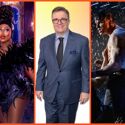
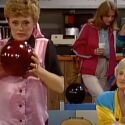
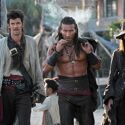





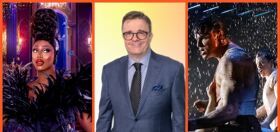





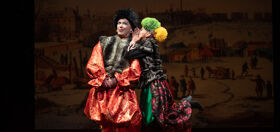

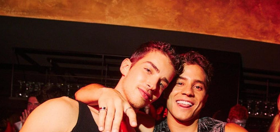
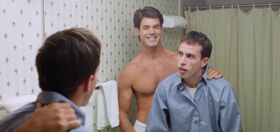
Memmorium
Good idea!
P.S. A U realy girl?